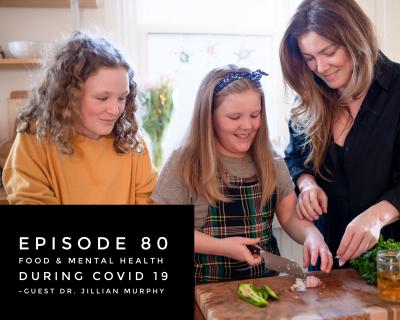 Jillian’s second guest appearance on The Family Brain Podcast came during the earlier days of Covid-19 lock downs here in Texas and around the world.
Jillian’s second guest appearance on The Family Brain Podcast came during the earlier days of Covid-19 lock downs here in Texas and around the world.
I found myself for the first time moderately grasping how those who grew up during the Great Depression or with parents who lived through that time struggle with the idea of food waste. My husband and I stocked up on all kinds of food for our family of 5, not knowing if we would be able to get to a store and what that would look like if we could. I found myself snapping at my kids if they did not finish meals. I also found myself being much more mindful of my own consumption with a worry around running out of food. I wanted to talk to Jillian about what she was seeing in her work with people around food health. I find her approach and demeanor so inviting and comforting, and this time talking with her was not any different.
Our recording ended up being the most listened to episode of my season focused on coping with Covid-19. One of points that we talked about that stuck with me is the idea of remembering Maslow’s Hierarchy of needs and how that hierarchy comes into play during this wild ride of Covid-19. The basic concept of the hierarchy is that basic needs like food, rest, shelter and water and just above that a sense of security and safety are critical building blocks that once satisfied allow us to focus on psychological needs like connection, self-esteem, and creativity. I love that Jillian reminds us of this hierarchy to allow ourselves self-compassion in perhaps not feeling quite as creative or connected when struggling with a basic need like food.
In her work during the pandemic, Jillian has notices three trends, one is that of stress from chronic dieters who may feel out of control due to lack of food access or a change in routine. She has also noticed a settling in of some of the lessons learned by clients recovering from a chronic dieting mindset, and an opportunity to acknowledge the progress made during this unsettling time. Last, she has noticed that many families are just worn out from all the food prep, cooking, and cleaning. Jillian has such a great way of returning to the basics of her work, a method she learned from Ellyn Satter, which focuses on being positive, comfortable, and flexible with eating as well as matter-of-fact and reliable about getting enough to eat of enjoyable and nourishing food. Sounds so simple but Jillian is realistic that this is not always easy in practice.
Check out my conversation with Jillian, and when you love her like I know you will, hear more from her on her podcast, Food Freedom, Body Love or www.foodfreedombodylove.com

 Jillian’s second guest appearance on The Family Brain Podcast came during the earlier days of Covid-19 lock downs here in Texas and around the world.
Jillian’s second guest appearance on The Family Brain Podcast came during the earlier days of Covid-19 lock downs here in Texas and around the world.